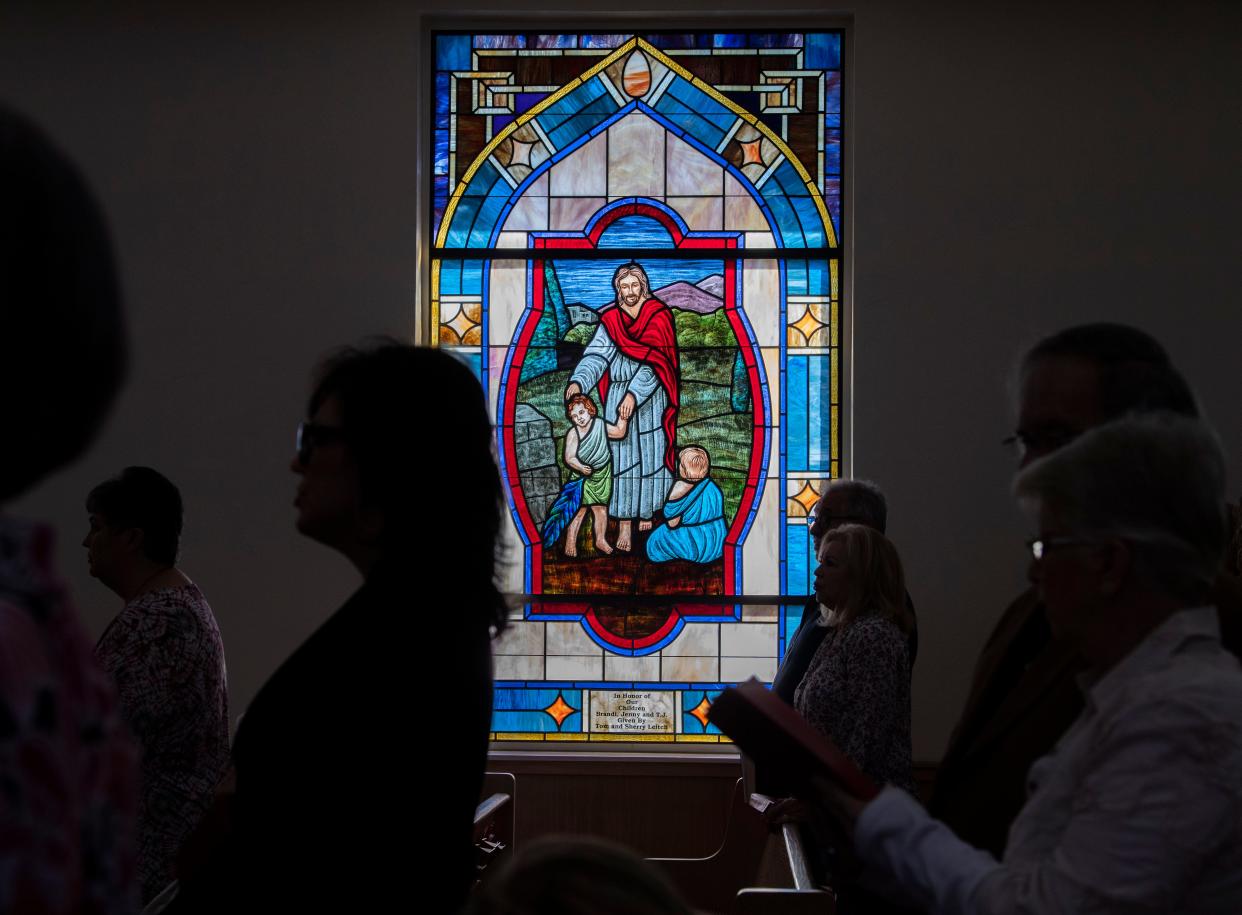It was a dramatic year for the United Methodist Church.
Regional conferences recently finished meeting for special sessions, which propelled an exodus of conservative churches from the UMC and marked one of the most consequential years in decades for the mainline Protestant denomination.
Regional conference delegates ratified 1,517 disaffiliations, or departures, from the UMC this fall, adding to 310 from the summer, according to regional conference records.
It’s a steep increase from prior years due to the May launch of a new traditionalist denomination, the Global Methodist Church. Although churches leaving the UMC represented less than 10% of the total churches in the UMC, the departures affected some regions more heavily and left the UMC with major questions about future revenue.
Disagreements over church policy and theological beliefs, including dealing with LGBTQ rights, intensified in 2016 after some United Methodist clergy came out as LGBTQ and the election of the first lesbian bishop, Karen Oliveto.
Summer disaffiliations:United Methodists grapple with schism as 300-plus churches leave across U.S.
“We’ve seen it coming for years but now it’s actually here,” said the Rev. Chris Ritter, a United Methodist pastor in Illinois who updates an online compendium of news about the UMC splintering.
“The May 1 launch of the Global Methodist Church gave something for congregations to join. There hadn’t been anywhere to go except to an independent status or another denomination until that point,” said Ritter, who has held leadership roles with traditionalist Methodist groups and whose church is pursuing disaffiliation. “So, that was a watershed moment.”
Explainer: United Methodist higher education and the denomination’s splintering
The Global Methodist Church launched preemptively after UMC officials yet again delayed the UMC General Conference when delegates from around the world gather to make policy decisions. The General Conference is now scheduled for April 2024 in Charlotte, North Carolina.
The General Conference’s postponement delayed a highly anticipated vote on a plan, commonly referred to as The Protocol, that would split the denomination, leading the Global Methodist Church to launch despite The Protocol’s stasis.
Eight months later, “the Global Methodist Church is excited about the hundreds of churches globally that have already or that are in the process of becoming member congregations,” the Rev. Keith Boyette, Global Methodist Church transitional connectional officer, said in a statement. “We are focused on continuing to build our structure as provisional annual conferences are being launched globally.”
The Global Methodist Church expects to have nine provisional regional conferences, five of which will be in the U.S., by Jan. 1, Boyette said. Six hundred churches have joined the new denomination as of early December and is expected to increase soon with churches that received approval in the last few weeks to leave the UMC.
The UMC, of which many of its general agencies are based in Nashville, is the largest mainline Protestant denomination in the U.S. Before the split, it had more than 6.2 million members in the U.S., according to 2020 data.
Regional conflict
The launch of the Global Methodist Church drove greater interest in disaffiliation and, as a result, conflict at the regional conference level.
Conservatives accused UMC bishops of treating churches unfairly, causing bishops to write letters or record videos to respond to what they considered false claims about their commitment to UMC policy.
Groups of conservative churches sued or threatened to sue their bishop, and called for churches to withhold giving to UMC regional conferences. Meanwhile, Arkansas Conference delegates ratified 35 disaffiliations but denied three other churches, outraging conservatives.
Bishops push back:United Methodist Church bishops mount defense amid conservative attacks
Oliveto, the first openly lesbian bishop to be elected and who leads the Mountain Sky Conference, said she has sought to send this message: “If you’re a progressive church, I want you to be the progressive church you can be. … And if you’re a conservative church, I want you to be the best conservative church you can be.”
Oliveto’s conference encompasses Colorado, Montana, Wyoming, Utah, and a part of Idaho. Six churches in the conference left the UMC this year, a tiny fraction compared to other regions of the U.S.
Oliveto said the relatively fewer disaffiliations in her conference is partly due to its more progressive bent, though conservatives have criticized the meeting among others for treating disaffiliating churches unfairly.
At the same time, Oliveto said the Mountain Sky Conference already dealt with the tumultuousness other regions are currently experiencing because conservative members left UMC churches in the West after her election in 2016.
“We’ve been needing to restabilize since 2016,” Oliveto said. For example, the Mountain Sky Conference has already enacted major budget adjustments in response to church giving declines.
UMC seminars deal with splintering:How United Methodist seminaries are navigating uncertain future as denomination splinters
“We’re in the midst of doing a major fund campaign because we’re clear now is the time to start planting new churches,” Oliveto said. “We’re saying now is the time to engage and do deeper church planting and evangelism.”
The Nashville-based UMC General Council on Finance and Administration is projecting a 21% decrease in total giving from churches to the UMC throughout the denomination by 2025.
Staying and leaving
As someone who wants the UMC to be more accepting of LGBTQ people, Oliveto is optimistic.
A recent sign was a public apology to Oliveto during a November jurisdictional conference meeting about a 2016 petition that protested Oliveto’s election.
“It was very emotional to receive it. It brought up so much of the woundedness that I lived through,” Oliveto said. “But I have to say that that was my experience in 2016 in terms of, for every critical letter I received, I received 200 that were like ‘Thank you. You’ve given me faith in the church again.’”
Reconciling Ministries Network, a national organization that advocates for LGBTQ inclusion in the UMC, saw 260 new congregations vote to become reconciling congregations in the past four years, according to Reconciling Ministries Network spokesperson Ophelia Hu Kinney.
“I think the people in the pews are in a different place than our polity,” Oliveto said.
But that polity will likely fuel even more conflict next year, specifically over the disaffiliation process.
Disaffiliation was always intended to be a temporary fix and The Protocol, or the plan to split the denomination, was seen as a more permanent solution. But support for The Protocol has withered in recent months and many expect it to fail at the UMC General Conference in 2024.
“I think The Protocol is a dead letter at this point,” Ritter said.
So, disaffiliation is the most viable route for churches to leave the UMC. However, those churches are racing against the clock because the policy allowing disaffiliations will sunset at the end of 2023.
Already, regional conferences have scheduled special sessions for next year.
“I think there’s going to be more disaffiliations,” Ritter said. “I’m not sure we’re at the halfway mark yet before the end of next year.”
Liam Adams covers religion for The Tennessean, part of the USA TODAY Network. Reach him at [email protected] or on Twitter @liamsadams.
This article originally appeared on USA TODAY: United Methodist splintering 2022 takeaways Global Methodist
Source: Read Full Article


